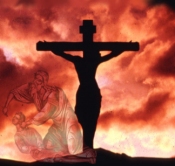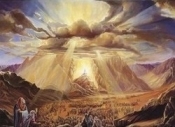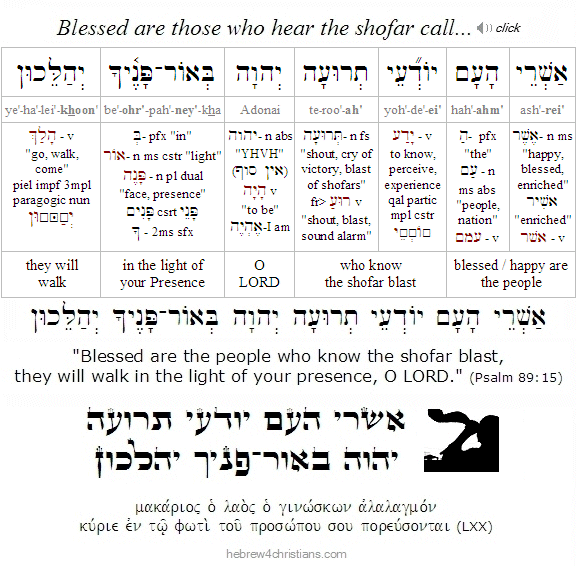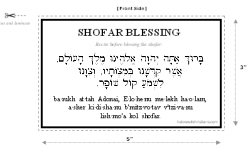The shofar (ram's horn) is often used as an instrument of spiritual warfare... For example, the Torah states, "When you go to war in your land against an adversary who is oppressing you, you are to sound an alarm with trumpets; then you will be remembered before the LORD your God and you will be saved from your enemies" (Num. 10:9).
The Ram's Horn and the Akedah
The shofar first brings to mind the ram caught in the thicket by its horns which Abraham sacrificed in place of his son Isaac at Mount Moriah (Gen. 22:13). By extension, this "Ram of God" -- prepared from the "foundation of the world" -- is a picture of substitutionary sacrifice of the God's Son for the sins of the world. Indeed, the first occurrence of the word love in the Torah (אהבה, ahavah, in Gen. 22:2) refers to a father's love for his "only" son who was offered as a sacrifice, a clear foreshadowing of the greater "Akedah message" of the Gospel (John 3:16). Note in this connection that the sacrificial redemption involved violent spiritual warfare between God and the Satan (Gen. 3:15). For the believer in Yeshua, the blast of the shofar represents the shout of God's victory (נִצָּחוֹן) over the power of sin and death.

The Shofar in Scripture
In the Scriptures, the word shofar (שׁוֹפָר) first occurs in Exodus 19:16 when the Torah was first given to Israel during Shavuot (i.e., "Pentecost"): "On the morning of the third day there were thunders and lightnings and a thick cloud on the mountain and a very loud shofar blast(קל שׁפָר חָזָק מְאד), so that all the people in the camp trembled.... And as the sound of the trumpet grew louder and louder, Moses spoke, and God answered him in thunder." This shofar blast is sometimes called the "first trump" of God.

The shofar is also mentioned in connection with bothRosh Hashanah (Lev. 23:24, Num. 29:1) and the Yom Kippur Jubilee: "Then, on the tenth day of the seventh month, on Yom Kippur, you are to sound a blast on the shofar; you are to sound the shofar all through your land" (Lev. 25:9). In later Jewish history, since the shofar was sounded throughout the preceding month of Elul, the blowing of the shofar on the first of Tishri (i.e., Rosh Hashanah) was sometimes called "the last trump," while the shofar blast on Yom Kippur was called the "great trump," since at that time judgment was sealed.
Apart from these purposes, the shofar was also used to sound alarms for the camp of Israel (Num. 10:5-6, Ezek. 33:3), to convene assemblies, to announce the new moon and the Jubilee Year, to herald messages, and to coronate kings. The shofar was also used when Joshua waged war against Jericho (Josh. 6:4-20) and during other military campaigns (Judges 7:22). Indeed, when Israel engaged the enemy in battle, the priests and Levites would first prepare the way by sounding the shofar (2 Chron. 3:12, Neh. 4:14, Jer. 4:19, Amos 2:2, Zeph. 1:6, etc.).
The shofar was also used during worship at the Tabernacle and Temple. It was sounded when the Ark of the Covenant was returned to the camp (1 Sam. 4:5, 2 Sam. 6:15) and was regularly used as an instrument of praise in the Temple (2 Chron. 15:14, Psalm 47:6, 89:16, 150:5). Blowing the shofar declares that the LORD God is the King of the universe, as it says in Psalm 98:6, "With trumpets and the sound of the shofar (וְקוֹל שׁוֹפָר), shout for joy before the King ADONAI (הַמֶּלֶךְ יְהוָה)." The shofar also signals Israel's glorious redemption during the Day of the LORD (יוֹם־יְהוָה) at the end of the age (Isa. 27:13, Joel 2:1).
Yeshua spoke of the shofar blast from the angels who would "gather together His elect from the four winds, from one end of heaven to the other" (Matt. 24:31). Indeed, Yeshua Himself will blow a shofar on the day of rapture: "For the Lord himself will come down from heaven with a rousing cry, with a call from one of the ruling angels, and with God's shofar; those who died united with the Messiah will be the first to rise" (1 Thess. 4:16). Moreover, at the sound of the "great shofar" (shofar hagadol), the dead will be raised and death itself will be "swallowed up" in victory (1 Cor. 15:51-57).
יוֹם אִירָא אֲנִי אֵלֶיךָ אֶבְטָח / "When I am afraid, I put my trust in you" (Psalm 56:4). This world - olam ha-zeh - is soon coming to an end, chaverim... Although we are tempted to fear the days of testing and tribulation to come, we must find a deeper reason to rejoice. We can anticipate the sound of the heavenly shofar signaling the victory of the LORD over the princes of this age: "The seventh angel sounded his shofar; and there were loud voices in heaven, saying, "The kingdom of the world has become the Kingdom of our Lord and his Messiah, and he will rule forever and ever!" (Rev. 11:15).
The Shofar and Teshuvah
During the start of this season of teshuvah it's important to recall that the shofar is also a means of awakening the slumbering soul... Maimonides writes: "There is a hidden message we are supposed to infer by listening to the shofar. It suggests to say: 'Sleeping ones! Awaken from your sleep! Slumbering ones! Awaken from your slumber! Examine your deeds. Remember your Creator and do teshuvah." This idea was earlier stated in the New Testament writings: "Awake, O sleeper, and arise from the dead, and Messiah will shine on you" (Eph. 5:13-14). This theme of "awakening from sleep" is used elsewhere in the Scriptures (e.g., John 11:11, Rom. 13:11, 1 Thess. 5:6, Dan. 12:1-2, Psalm 78:65, etc.). The sound of the shofar calls us to return to the LORD and seek His face. And since finding God is our greatest joy, King David rightly wrote: "Happy are the people who know the teruah [i.e. the shofar blast]" (Psalm 89:15).
Click to listen and learn the Hebrew text:
 |
The midrash says that word shofar (שׁוֹפָר) comes from a root (שָׁפַר) that means to "amend" or "reform," alluding to the beautification of our ways as we turn to God in teshuvah. "In this month (i.e., the seventh month of Tishrei) you shall amend (shapperu) your deeds. The Holy One, blessed be He, said to Israel: 'If you will amend (shippartem) your deeds I shall become unto you like a horn (shofar). As the horn takes in the breath at one end and sends out at the other, so will I rise from the Throne of Judgment and sit upon the Throne of Mercy and will impart for you the Attribute of Justice into the Attribute of Mercy.' (Vayikra Rabbah: 29:6)
May the LORD God of Israel bless you and keep you and shine His glory upon you for this coming new year! And may you be ready to hear the sound of the heavenly shofar that will call you into His glorious presence soon!
Learn the Shofar Blessing

I designed a Shofar blessing "Study Card" to help you learn to recite the Hebrew blessing before sounding the shofar. You can download it here.
There are four primary types of shofar blasts, though some of these may be combined: - Tekiah (תְּקִיעָה) - A long single blast (the sound of the King's coronation)
- Shevarim (שְׁבָרִים) - Three short wail-like blasts (signifying repentance)
- Teru'ah (תְּרוּעָה) - Nine staccato blasts of alarm (to awaken the soul)
- Tekiah ha-Gedolah (תְּקִיעָה הַגְּדוֹלָה) - A great long blast (for as long as you can blow!)
The general custom is to first blow tekiah, followed by shevarim, followed by teruah, and to close with tekiah | 





No comments:
Post a Comment